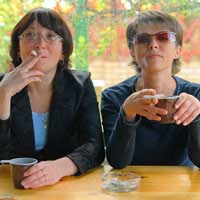What is the Biological Age Test?

“How old are you?” Everybody knows their chronological or calendar age, corresponding to the number of years since they were born. But when it comes to determining how fast we’re actually ageing, this number can mean very little. What you need is your “real age” or “biological age” which is based on an assessment of the physiological processes and physical properties of various parts of your body, compared to a population average, to give you an indication of just how much and how fast your body is actually ageing.
A new tool for measuring ageing and health…
In recent years, many health professionals - and people in general - have come to realise the importance of “biological age” when considering issues like health maximisation and life expectancy. For example, a 25 year old man who smokes and drinks heavily may actually have a biological age of 42, meaning that he is ageing much faster and vulnerable to more diseases than he realises. In fact, many major health centres in the US and Europe now use tools that measure biological age to monitor and evaluate their patients.Furthermore, it is believed that measures of biological age allow you to determine not just how quickly you are ageing in reality but also which parts of your body are ageing faster than others (faster than the average for your age group). This would help to highlight areas of potential concern and allow you to incorporate changes and preventative actions into your daily routine, in the form of exercise regimes, lifestyle changes, nutritional supplements, drug treatment or use of homeopathic therapies. After you incorporate these changes, you can then measure your biological age any improvements. In effect, it is believed that you’re maximising your years of healthy function and hopefully increasing your overall life expectancy.
Given all these potential benefits, it is not surprising that many people are keen to measure their “biological age” and a plethora of Internet sites have sprung up, offering tools to help you scientifically determine your “real, biological age”, together with the promise of follow-up advice and recommendations that will help you remain younger for longer. Given most people’s obsession with staying young and living longer, this is a tempting offer that many have taken up. One of the sites boasts over 27 million test participants!
Questionable ethics, questionable data, questionable concept?
There have been criticisms of these sites and these “biological age test tools”, however. In the US, for example, in many cases, the huge amount of detailed, specific private health information collected from test participants – not normally accessible for marketing purposes - is stored in databases which are then sold to pharmaceutical companies, allowing them to target potential customers. Many question the ethics of this practice, particularly when marketing material received by the targeted group causes anxiety about a disease before a diagnosis is even confirmed.Other criticisms centre on the fact that many of these biological age test tools only concentrate on physiological measurements and do not also consider the importance of biochemical changes, with many important markers not being measured – and therefore rendering the results inaccurate. In addition, some of the tools only have a limited pool of data for comparison, which means that the “population averages” they base their results on were potentially inadequate.
Finally, many scientists and researchers are doubtful about the value of the concept of “biological age” in the first place – they believe that there are so many different, sophisticated and interrelated processes contributing to the process we call “ageing” that the concept of a single biological age which can be tied to a measure of health is fundamentally flawed and meaningless.
The best tool for measuring your age: common sense!
At the end of the day, you don’t necessarily need to choose a side in the debate or even use an online tool to determine your “real age”. Common sense will tell you that certain practices will shorten your lifespan, regardless of the number indicating your calendar age. For example, how fast you are ageing is heavily influenced by your Body Mass Index (BMI) which determines whether you are underweight, in the health weight range or obese, for your height and gender. It goes without saying that individuals in the healthy weight range will likely have a lower biological age!Similarly factors like toxins you are introducing into your body (eg. nicotine, alcohol) and the general function of your various systems (e.g.. digestive, immune) will all play a role in raising or lowering your biological age. Even your attitudes and general mood can play a large part.







